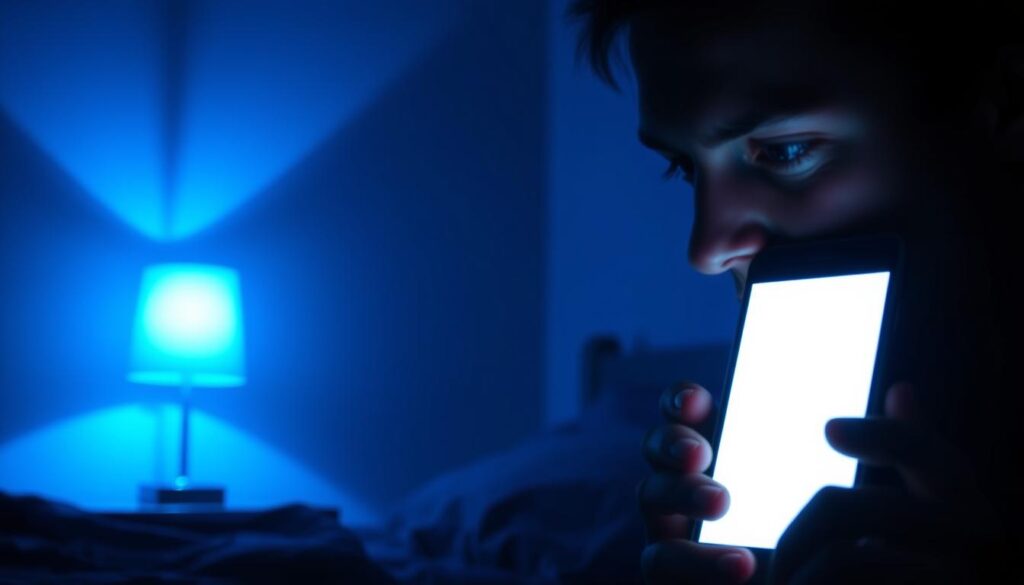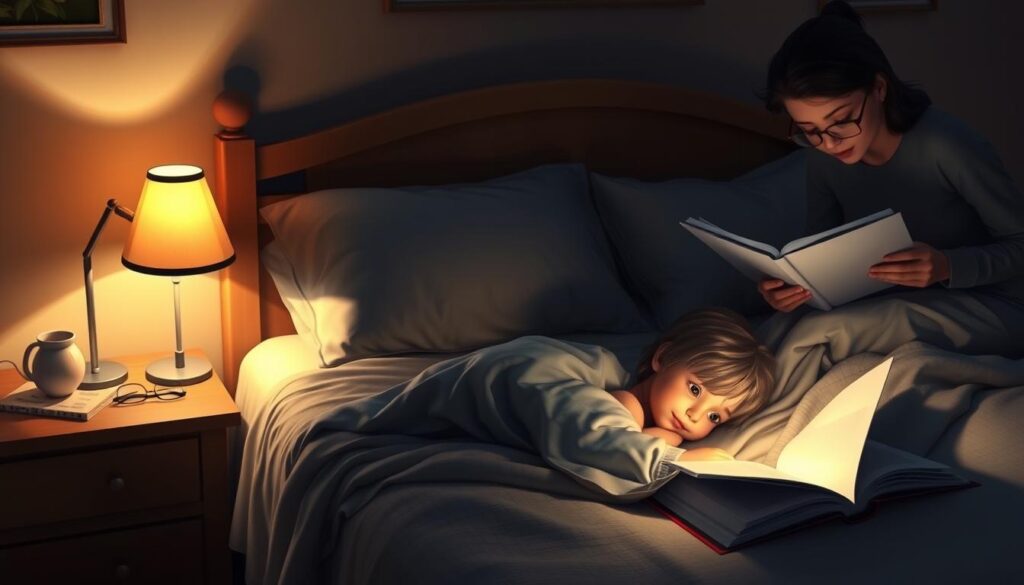As a parent, I’ve often wondered if our nightly routine of reading a book together is helping or hindering my child’s sleep. It’s a cozy moment we both cherish, but could it be keeping their mind too active for rest?
Many of us switch between a story and digital distractions like phones, especially as the night winds down. While reading can be calming, an overstimulated brain might struggle to relax. The key is finding a balance that works for your family.
Creating a consistent habit of winding down with a book can reduce stress and signal to the body that it’s time to rest. It’s not just about the activity itself but the routine that prepares the mind for a peaceful sleep.
Understanding the Impact of Digital Distractions on Sleep
Digital distractions seem to sneak into our bedtime routine more often than I’d like. Whether it’s checking the time on a phone or scrolling through content, these habits can disrupt our natural sleep cycle. Research shows that bright screens at night confuse our body’s internal clock, making it harder to wind down.
How Screen Time Disrupts the Sleep Cycle
Looking at a bright screen before bed sends a confusing signal to the mind. Studies reveal that blue light from devices suppresses melatonin, the hormone that helps us feel sleepy. This delay in melatonin production can push back your sleep cycle, leaving you tossing and turning.
For example, I’ve noticed that when my child uses a phone before bed, it takes them longer to fall asleep. The engaging content keeps their mind active, making it harder to relax. This isn’t just a personal observation—research backs it up.
Comparing Reading on Paper vs. Using a Phone
Reading a novel under a soft lamp feels worlds apart from scrolling on a phone. The page of a book doesn’t emit blue light, so it doesn’t interfere with melatonin production. This makes it easier for the body to prepare for rest.
Here’s a quick comparison:
| Activity | Impact on Sleep |
|---|---|
| Reading on Paper | Calms the mind, promotes relaxation |
| Using a Phone | Delays melatonin, increases stress |
Shifting from screens to paper can have measurable benefits. It’s a small change that can make a big difference in your sleep rate and overall well-being.
The Science of Blue Light and Sleep Disruption
The glow of your screen might be doing more harm than you realize. Blue light, emitted by phones, tablets, and computers, plays a significant role in disrupting your sleep. It’s not just about brightness—it’s about how this light affects your body’s natural rhythms.

How Blue Light Affects Melatonin Production
Your brain relies on a hormone called melatonin to signal that it’s time to rest. Exposure to blue light at night suppresses this hormone’s production, making it harder to fall asleep. Studies show that even a few minutes of screen time can delay melatonin release by up to an hour.
This disruption isn’t just a minor inconvenience. Over time, it can lead to chronic sleep issues, affecting your overall health. For example, research reveals that people who use devices before bed take longer to fall asleep and experience less restorative rest.
Smart Alternatives for a Restful Night
If screens are part of your evening routine, there are ways to minimize their impact. Switching to red or orange light sources can help, as these wavelengths don’t interfere with melatonin. Another tip is to use “night mode” on your devices, which reduces blue light emissions.
For a more relaxing option, try audiobooks or sleepcasts. These alternatives allow you to unwind without the stimulating effects of screens. A 2014 study found that participants who listened to calming audio fell asleep faster and enjoyed better sleep quality.
Small changes, like dimming your lights or setting a screen curfew, can make a big difference. Your body will thank you for it.
When and Why to Stop Reading Before Bedtime
Finding the right moment to put down a book can be tricky, especially when the story is captivating. While reading is a wonderful way to unwind, it’s important to recognize when it might be keeping your mind too active for rest. Timing is everything when it comes to balancing the joy of a good book with the need for a peaceful night’s sleep.
Recognizing the Signs of Overstimulation
One of the biggest challenges is knowing when to pause. Even a gripping novel can become counterproductive if it leaves your brain buzzing. Signs of overstimulation include restlessness, difficulty focusing, or feeling wide awake despite being tired. These are clear indicators that it’s time to put the book down.
In a five-night experiment, participants who read engaging material too close to bed took longer to fall asleep. The study highlighted the importance of distinguishing between calming and stimulating content. For example, a light-hearted story might relax you, while a suspenseful thriller could have the opposite effect.
Rules for a Balanced Routine
To create a healthy routine, consider these simple rules:
- Set a timer for reading, ideally 20-30 minutes before bed.
- Stick to physical books or pages instead of screens to avoid blue light.
- Implement the “No Phone Bed” rule to minimize distractions.
These small changes can help you enjoy the benefits of reading without compromising your sleep. Remember, the goal is to wind down, not rev up.
Listening to Your Body
Pay attention to subtle signs of overtiredness in yourself or your child. Yawning, rubbing eyes, or losing interest in the book are cues that it’s time to stop. Reading beyond this point can lead to a reversal in benefits, making it harder to relax.
Here’s a quick comparison of activities and their impact:
| Activity | Impact on Sleep |
|---|---|
| Reading a Physical Book | Calms the mind, promotes relaxation |
| Using a Phone | Increases stress, delays sleep |
By tuning into your body’s signals and setting boundaries, you can make reading a positive part of your nightly routine. It’s all about finding the right balance for a restful night and a refreshed day ahead.
Crafting a Calming Bedtime Routine
Creating a peaceful bedtime routine can transform your evenings into a calming ritual. It’s not just about what you do but how you prepare your mind and body for rest. A consistent routine signals to your brain that it’s time to wind down, making it easier to fall asleep.
Creating a Relaxing Environment
Your bedroom should feel like a sanctuary. Start by adjusting the lighting—opt for soft, warm lamps instead of harsh overhead lights. This reduces strain on your eyes and helps your body produce melatonin, the hormone that promotes sleep.
Here are a few steps to design a distraction-free space:
- Keep your bed clutter-free and inviting.
- Use blackout curtains to block outside light.
- Set the room temperature between 65 to 68 degrees Fahrenheit for optimal comfort.
Selecting Soothing Reading Material
Choosing the right book is crucial. Opt for gentle narratives that calm your mind rather than overstimulate it. Avoid suspenseful or intense stories that might keep your brain active.
Here’s how to pick the perfect good book:
- Look for light-hearted or inspirational themes.
- Stick to physical pages to avoid blue light from screens.
- Limit reading time to 20-30 minutes to prevent overstimulation.
Pairing your reading with mindfulness techniques, like deep breathing or gentle stretches, can further reduce stress and prepare you for a restful night.
Personal Experiences: Real-Life Bedtime Reading Trials
Curiosity led me to test how reading before bed affects my sleep over five nights. I wanted to see if this habit truly helps the mind relax or if it keeps it too active. Each night, I documented my observations, from the number of pages read to how quickly I fell asleep.

On the first night, I chose a light-hearted story and read for 20 minutes. I noticed my body felt calmer, but I still glanced at my phone twice. By the third night, I set a rule: no phone after 9 PM. This small change made a big difference. I felt more immersed in the book and less distracted.
Lessons Learned from a Five-Night Experiment
One of the most surprising moments came on the fourth night. I was so engrossed in a good book that I didn’t even notice the time. When I finally put it down, I fell asleep almost instantly. This showed me how powerful a story can be in helping the mind transition to rest.
Here are some key takeaways from my experiment:
- Reading a physical book reduces stress and helps the body prepare for sleep.
- Setting a time limit (20-30 minutes) prevents overstimulation.
- Avoiding light from screens enhances the calming effect of reading.
By the fifth night, I felt a noticeable improvement in my sleep quality. I woke up feeling refreshed and ready for the day. This experiment taught me that a consistent bedtime routine, centered around reading, can have profound benefits for both the mind and body.
How Reading Before Bed Benefits Your Health and Well-Being
Unwinding with a good book has become a cherished part of my evening routine, but I’ve always wondered how it truly impacts my health. Over time, I’ve discovered that this simple habit offers more than just relaxation—it’s a powerful tool for improving both physical and mental well-being.
Reducing Stress and Enhancing Focus
One of the most immediate benefits of reading before bed is its ability to reduce stress. Studies show that just six pages of a book can lower stress levels by up to 68%. This is because immersing yourself in a story helps shift your focus away from daily worries, allowing your mind to relax.
For example, I’ve noticed that after a stressful day, reading even for a short while helps me feel calmer. It’s like hitting a reset button for my brain. Research also suggests that this habit can improve focus and cognitive function, making it easier to tackle challenges the next day.
Improving Sleep Quality and Daily Energy
Reading before bed doesn’t just calm your mind—it also prepares your body for rest. Unlike screens, which emit blue light and disrupt melatonin production, a physical book creates a soothing environment. This makes it easier to fall asleep and enjoy deeper, more restorative rest.
Here are some ways this habit can transform your nights and days:
- It signals to your body that it’s time to wind down, improving sleep quality.
- Consistent routines help regulate your internal clock, making it easier to wake up refreshed.
- Better sleep leads to increased energy and productivity during the day.
By making reading a regular part of your bedtime routine, you’re not just enjoying a good story—you’re investing in your overall health and well-being. Why not give it a try tonight?
Tips for Transitioning from Screens to a Book
Switching from screens to a book can feel like a challenge, but the benefits are worth it. Many of us are used to scrolling through our phones before bed, but this habit can disrupt our sleep. The good news is that with a few simple changes, you can create a calming routine that helps your mind and body prepare for rest.
Establishing a No-Phone Rule at Night
One of the most effective ways to reduce distractions is to set a no-phone rule in the evening. Start by designating a specific time when all devices are put away. For example, you might decide that phones stay out of the bedroom after 8 PM. This creates a clear boundary and helps your mind shift focus.
Here are some actionable tips to make this easier:
- Use a traditional alarm clock instead of your phone to avoid temptation.
- Charge devices in another room to reduce the urge to check them.
- Replace screen time with a relaxing activity, like reading a book or journaling.
Integrating Mindfulness and Meditation Techniques
Mindfulness can be a powerful tool to ease the transition from screens to paper. Simple practices, like deep breathing or a short meditation session, can help calm your mind and signal that it’s time to wind down. Pairing these techniques with reading can enhance the calming effect.
For example, try this routine:
- Spend 5 minutes focusing on your breath to clear your mind.
- Read a few pages of a book under soft light to relax further.
- End with a gratitude exercise to shift your focus to positive thoughts.
Making these changes can feel small at first, but the long-term benefits are significant. You’ll likely notice improved sleep quality, reduced stress, and a greater sense of calm. Why not give it a try tonight?
Conclusion
Creating a calming routine before bed can transform your nights and improve your days. Choosing a book over screens helps your mind relax and prepares your body for rest. Science shows that blue light from devices disrupts melatonin, making it harder to fall asleep. Switching to a physical book can make a big difference.
From personal trials, I’ve seen how reading reduces stress and boosts daytime energy. Simple changes, like setting a time limit and creating a soothing environment, can enhance your sleep quality. It’s not just about the activity but the routine that signals it’s time to wind down.
Why not try it tonight? A dedicated routine can calm your mind and set the stage for a better tomorrow. Small steps lead to big changes—your body will thank you.
FAQ
How does screen time affect my child’s sleep cycle?
Screen time, especially before bed, can disrupt your child’s sleep cycle by emitting blue light. This light suppresses melatonin production, making it harder for them to fall asleep and stay asleep.
Is reading a physical book better than using a phone before bed?
Yes, reading a physical book is better than using a phone. Books don’t emit blue light, which helps maintain melatonin levels and supports a more restful night’s sleep.
How does blue light impact melatonin production?
Blue light from screens tricks the brain into thinking it’s still daytime, reducing melatonin production. This hormone is essential for signaling the body that it’s time to sleep.
What are some smart alternatives to screens before bed?
Opt for activities like reading a physical book, listening to calming music, or practicing mindfulness. These alternatives help prepare the mind and body for sleep without disrupting melatonin levels.
How can I recognize if my child is overstimulated before bed?
Signs of overstimulation include restlessness, difficulty settling down, and increased irritability. If your child struggles to relax, it might be time to adjust their bedtime routine.
What can I do to create a calming bedtime environment?
Dim the lights, reduce noise, and choose soothing activities like reading a gentle story. A calm environment signals to the body that it’s time to wind down.
What type of reading material is best for bedtime?
Choose calming, age-appropriate books with gentle themes. Avoid exciting or suspenseful stories that might overstimulate your child.
How can reading before bed improve my child’s health?
Reading before bed can reduce stress, improve focus, and enhance sleep quality. It also fosters a sense of calm, making it easier for your child to fall asleep and wake up refreshed.
How can I transition my child from screens to books at night?
Start by establishing a no-phone rule an hour before bed. Introduce a consistent reading routine to help your child associate books with relaxation and sleep.
Can mindfulness techniques help with bedtime?
Absolutely! Practices like deep breathing or meditation can calm the mind and body, making it easier for your child to transition into a peaceful sleep.




